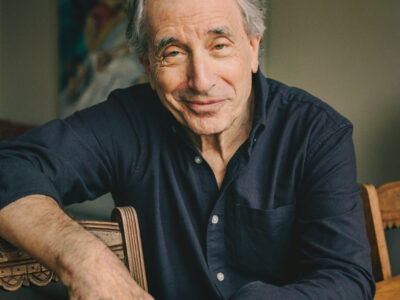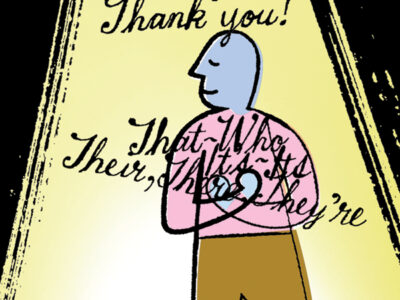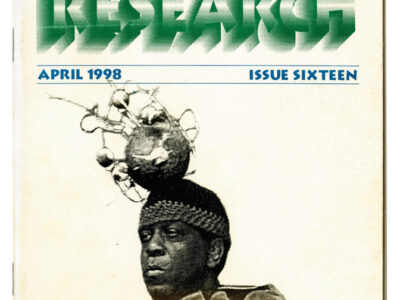
Class of ’82 | When Denise Gordon C’82 stopped by to chat with us over Alumni Weekend last May, she didn’t bother to mention that she had almost died from a pulmonary embolism the month before. (“How would I have worked that into the conversation?” she asks wryly. “Perhaps, ‘Hi, my name is Denise, and I sing and almost died last month.’ I can see you racing to profile me in the Gazette.”)
Instead she sent us a CD and talked about her singing career, as well as her other career, the one that took her to Africa and led to her serving as head of the U.N.’s Office for the Coordination of Humanitarian Affairs in Burundi, among other things. It wasn’t until after she gave birth to a baby boy named Kenyon in October that she let slip the fact that her doctor hadn’t thought she would leave the hospital alive when she first showed up in April with a blood clot that had lodged at the opening of her lungs. But we’re getting ahead of ourselves here.
Gordon knew that she wanted to be a singer from the time she was a little girl in New York, using a towel as a microphone in her acoustically rich bathroom. Though her musical taste evolved over the years, from Diana Ross and Stevie Wonder to Des’ree and Cameroonian saxophonist Manu Dibango, the urge to sing—and perform—never changed.
It wasn’t until she had finished a “confused” first semester at Penn that the other part of her destiny kicked off. That was when her somewhat-exasperated mother handed her an article about a cultural-exchange program called Operation Crossroads Africa.
The trip to Kenya that followed was the start of a dual life that combined some very intense development and humanitarian experiences—wars, starvation, massive displacement—with, eventually, singing: first in nightclubs and other venues, and more recently on a CD. (For more on that, see www.DeniseGordon.com.)
Gordon says she was inspired to learn French at Penn by the presence of a cute Haitian fellow on the French Floor of Language House, where she was a resident of the Spanish Floor. While her new fluency in French didn’t keep her heart from getting broken, it would give her a leg up in the Peace Corps and, later, other job opportunities in francophone countries.
This past September, a few weeks before giving birth to Kenyon in Washington, Gordon spoke about her multi-layered career with Gazette senior editor Samuel Hughes.
Before you went, what were your conceptions/misconceptions about Africa?
That I would like it right from the start. I would just blend in and be the long-lost daughter from America. Following my time at Penn I spent two years as a Peace Corps volunteer in Senegal. They did embrace me—eventually. In the U.S. there is no mistaking: I am an African American. But in Senegal, they were caught up in the shade of my skin color, and somehow I was not dark enough to be considered other than a white American. I was on a Roots emotional tour and having the Africans refer to me as “white” was disturbing the journey.
Bottom line, when I realized that the 400-year gap between [my African ancestry] and my life in the U.S. made me more American than African, more different than the same, I settled in and started to enjoy my experience. In that enjoyment I could still trace the similarities of cultures between Africa and the U.S., but minus the guilt of me not embracing all things African.
What is it about Africa that inspired your humanitarian impulse?
From my first visit at 19 to Kenya, I knew that I wanted to work in Africa. However, the openings of opportunities are not in investment-banking firms or entertainment. The abundance of positions are in refugee camps, public-health centers, water and sanitation and nutritional development. So that is the direction I went.
What took you to the war zones of Kigali, Burundi, and Darfur?
In addition to Somalia and Ethiopia, these places were the scenes of horrific suffering on the continent. There are a lot of organizations that require American presence overseas, but as Americans we minimize the importance of learning other languages and ways of other cultures. So when these places exploded on the scene in the most horrific of ways, humanitarian organizations were desperately seeking French speakers who were willing to work there. I just answered the call.
Darfur was my need to be a part of a more intense emergency experience. I had been working in emergency operations for six years by 2005. I had been living in Burundi for four difficult years during their civil war. After 10 years of war there, the situation had become protracted and you just get used to 100,000 people displaced a month, malnutrition rates off the charts. It actually becomes an “accepted” way of life.
You will find that people who do humanitarian work for a living do become adrenalin junkies. They thrive on being in the thick of it, all the while shielding themselves from the very peril that affects the beneficiaries whose lives they are trying to save. Though I don’t feel that I have become an adrenalin junkie, there was a moment where I wanted my heart to race just a little.
How have those (much more difficult) experiences inspired you?
It makes you appreciate life. In war situations, life is so expendable. Imagine being 15 years old in a country that has been at war for the last 13 years, as in Burundi, or a war that has lasted 29 years, as was the case in Angola. If life is not outright extinguished, it is made to suffer. Perhaps it was my proximity to all this suffering that made me turn to music, just to give myself a break.
Did it feel weird to be singing American top-40 hits in post-genocide Rwanda?
Well, I found them already playing the music—I just asked to join in, and built on what was already going on. It could have been worse, me trying to sing Rwanda’s Top 40 hits in their native language (Kinyarwanda).
What do you bring to African music, and what does Africa contribute to yours?
To my own music, Africa contributes hope. Africa has played such an important part of my life these last 30 years, and as a musician, its music helps me tell my story. My contribution to African music may appear like a penny dropped in the ocean, but even that penny forms extending ripples. I believe that the countries where I have had the privilege to perform appreciate the energy and the R&B foundations that I bring to African standards such as “Malaika.” Fusion of rhythms, traditions, and vibes is one of the best ways to extend African music beyond its borders.
What are your plans, musically and otherwise?
I have switched gears for the moment, but hopefully I will work music back into my new life. I released a CD in 2006 entitled Wangu We (“You are mine” in Swahili). It is my personal journey put to music. I have been working on its promotion since then, through performances, entering my songs in competitions, and allowing inclusion into compilations such as “Rwanda for Darfur” and “Independent Musician Compilation.” I had made a name for myself as a performer in Nairobi, and was honored to sing the National Anthem at the U.S. Ambassador’s Independence Day commemoration. I performed at the cocktail reception of the Class of ’82 reunion last year, which was a blast!
I plan to return to Kenya and give full immersion to my music career, performing, writing, producing other artists—and filling my heart with my passion for my newborn baby and music.




